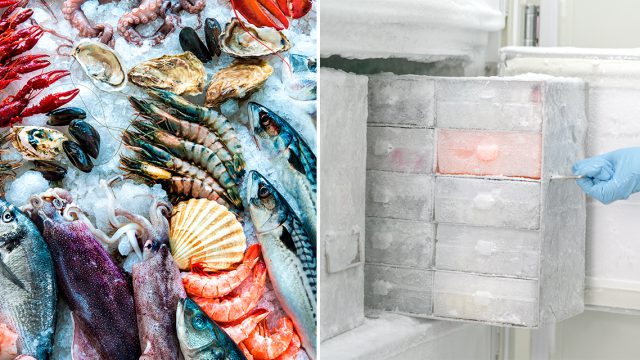The science behind refrigeration: The difference a degree makes in container shipping
And you probably won’t notice much difference between 1°C and 2°C – either way, it’s hat and gloves weather. But in container shipping, the fluctuation of a single degree can mean the difference between cargo arriving at its destination in perfect condition or being spoiled.

Why precision matters
Perishable foodstuffs, pharmaceuticals and some luxury goods need accurate, consistent temperature control to preserve quality. Knowing the right temperature for your load, and maintaining it no matter what the external conditions, is vital. Around half (45-55%) of all fruit and vegetables produced are lost or wasted along the supply chain. Temperature control has a key role to play in reducing food waste.
One problem is that the damage caused by incorrect temperatures may not be visible to the naked eye. A study into the transport of blackberries in pallets which were subject to uneven temperatures, showed that on arrival, more than half of the fruit did not have enough shelf life left for the longest supply route. This, despite any physical signs of deterioration.
Every additional degree in temperature harms the fruit. Blackberries should be quickly pulled down in temperature after harvesting, next transported at 0°C – by the time they’ve reached 10°C they’re losing shelf-life three times faster than normal.
Lack of precise temperature control has economic consequences. Efficiency gains are being found by suppliers and retailers all along the supply chain, from harvesting to stock control. The difference of half a degree within the cold chain could undo all the good work at either end of the transportation process. And with sustainability appearing in CEOs’ top ten strategic business priorities for the first time last year, shipping companies and fleet managers need to offer solutions for minimizing waste and cutting energy use. Cargo must be protected during shipping, and we cannot compromise on temperature control, this is why Thermo King controllers offers two modes that intelligently manage and controls cargo owners requirements.
How temperature changes affect fresh produce
Fruit and vegetables are at the mercy of changes in temperature as they make their journey from harvest to shelf.
Let’s take the apple as an example.
High temperatures
Apples are ‘climacteric’ fruits: they continue to ripen after harvesting. The fruit ‘respires’ (breathes) – a process which releases CO2, water vapor – and produces ethylene: a plant hormone that plays an important role in ripening. Higher temperatures speed up this biological activity, which can lead to shrivelling, fermentation and rotting. A study into Braeburn apples showed that increasing the temperature by just 1.7 degrees above the recommended 0°C increased core browning.
Low temperatures
Dropping the temperature too low can have catastrophic effects. Apples that are transported at lower-than-recommended temperatures can suffer chilling injuries including superficial scald (external browning). This is thought to be caused by the oxidation of a volatile compound, linked to ethylene production, in response to cold stress. Granny Smiths are believed to be particularly susceptible to superficial scald because they are picked early to retain their vibrant colour – and early harvested, immature fruit are more at risk.
Variabilities
Different cultivars’ characteristics or production methods mean they need different treatment. For instance, starch index values impact apples’ sensitivity to different temperatures and associated disorders; as do cooler or warmer growing seasons.
Shipping firms must carefully control temperatures for each type of fruit and vegetable, and each different cultivar or variant. Even within one type of produce, there are variances in recommended set points:
· Red Delicious apples: -0.6 to 0.6°C
· Granny Smith apples: 0 to 1°C
· Navel oranges: 3.3 to 7.2°C
· Valencia oranges: 0 to 2.2°C
· Cantaloupe melons: 0 to 5°C
· Honeydew melons: 5 to 10°C
Accuracy and affordability
Balancing ultraprecise temperature control with profitability isn’t straightforward for shipping firms. Tough conditions such as disparities in external weather conditions on long trips make moving fresh, frozen, and other high-value cargo a challenge for many.
It’s one reason Thermo King designed the Container Fresh & Frozen (CFF) unit, drawing on our understanding of the intermodal use of reefer units on rough roads and rougher seas.
CFF is accurate up to +/- 0.25°C in chilled mode and +/- 1°C in frozen mode, to keep even the most sensitive cargo in perfect condition.
It’s an affordable, multipurpose unit designed for flexible use between -30°C to +30°C. The MP-4000 controller helps you achieve specified fresh air rates and excellent energy efficiency. It comes with the industry-standard lower Global Warming Potential refrigerant R-134A, or R-513A from factory or as a drop-in.
Mitigate against errors
Even the best technology can’t prevent human errors during loading or unexpected delays en route. But with telematics, you can easily monitor the real-time temperature of individual loads in transit, and provide temperature graphs to your clients for their compliance procedures. What’s more, you can intervene remotely if there’s a problem, giving you extra control to maintain the exact temperature required.
Take control of your cargo
From the multipurpose CFF, to our industry-leading Magnum® Plus and SuperFreezer containers, temperature precision comes as standard. So you can take control of your cargo, down to the last degree.
Other relevant articles that might interest you

Marine
The future is colder: pharma cold chain in the age of mRNA vaccines.
The pharma cold chain plays a significant role in the distribution of mRNA vaccines, as it …

Marine
The hard knock life of a seagoing refrigerated shipping container and the alternative solution.
Refrigerated shipping containers travel the world carrying all manner of temperature sensitive loads, but often they …

